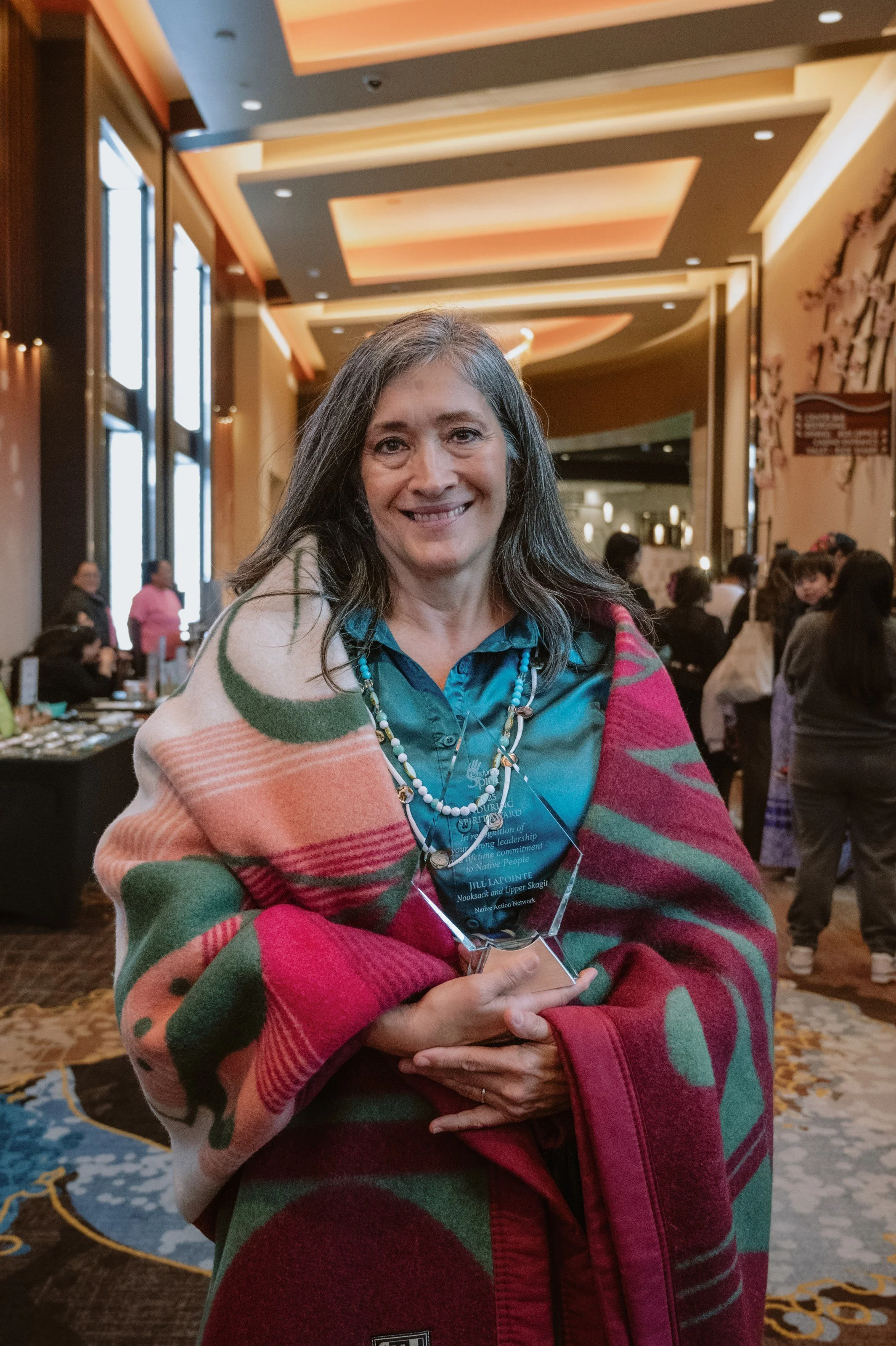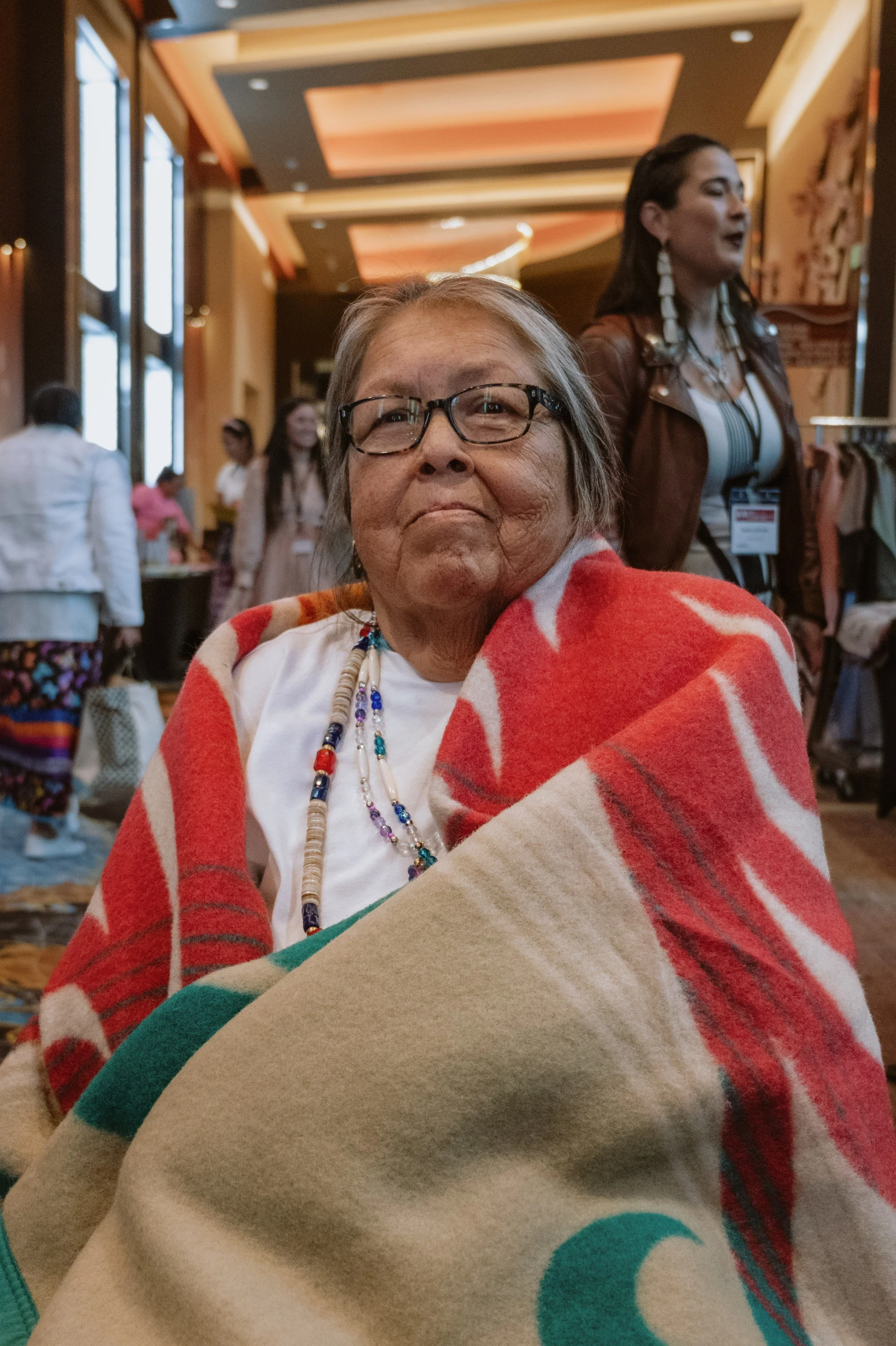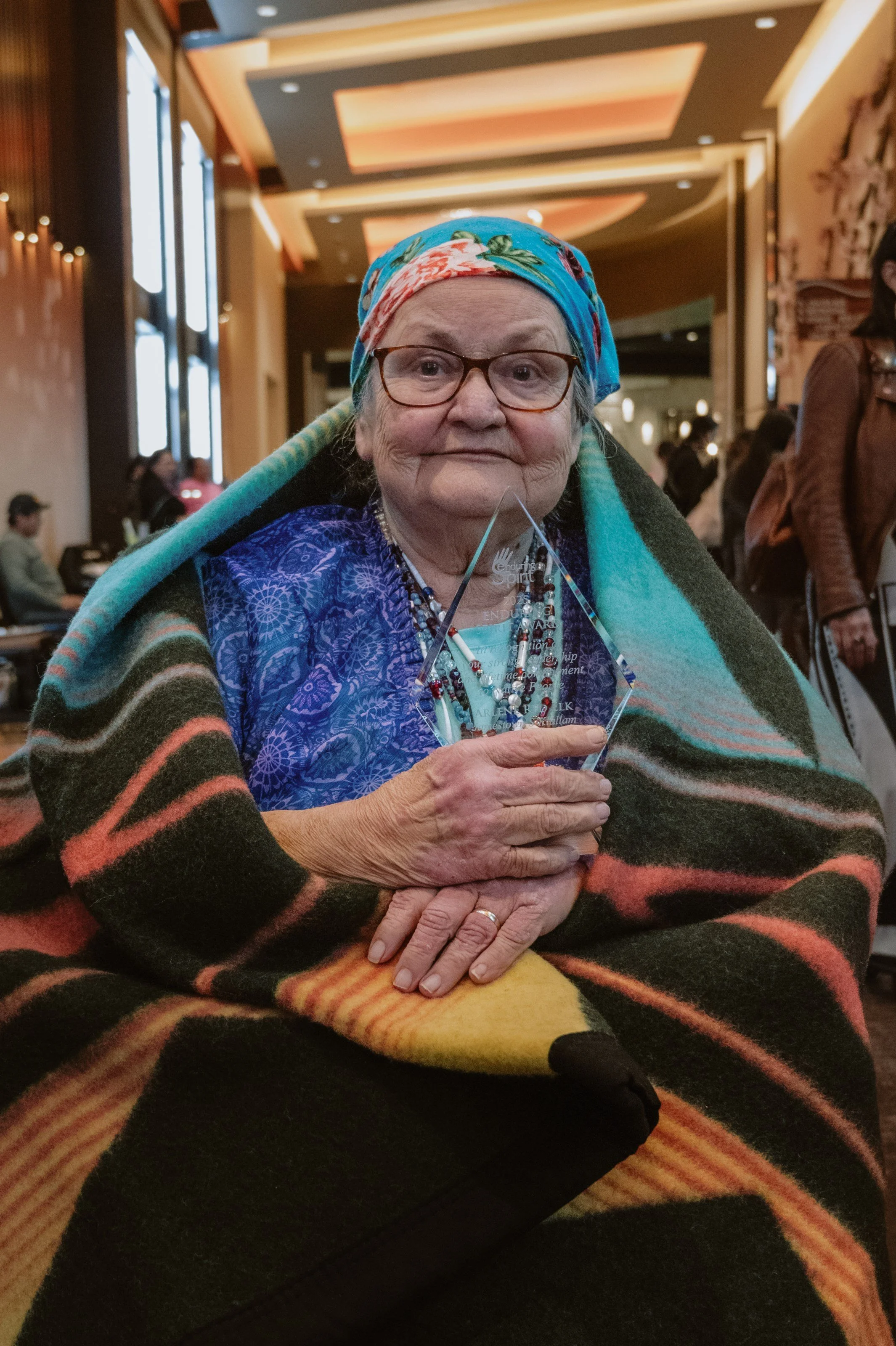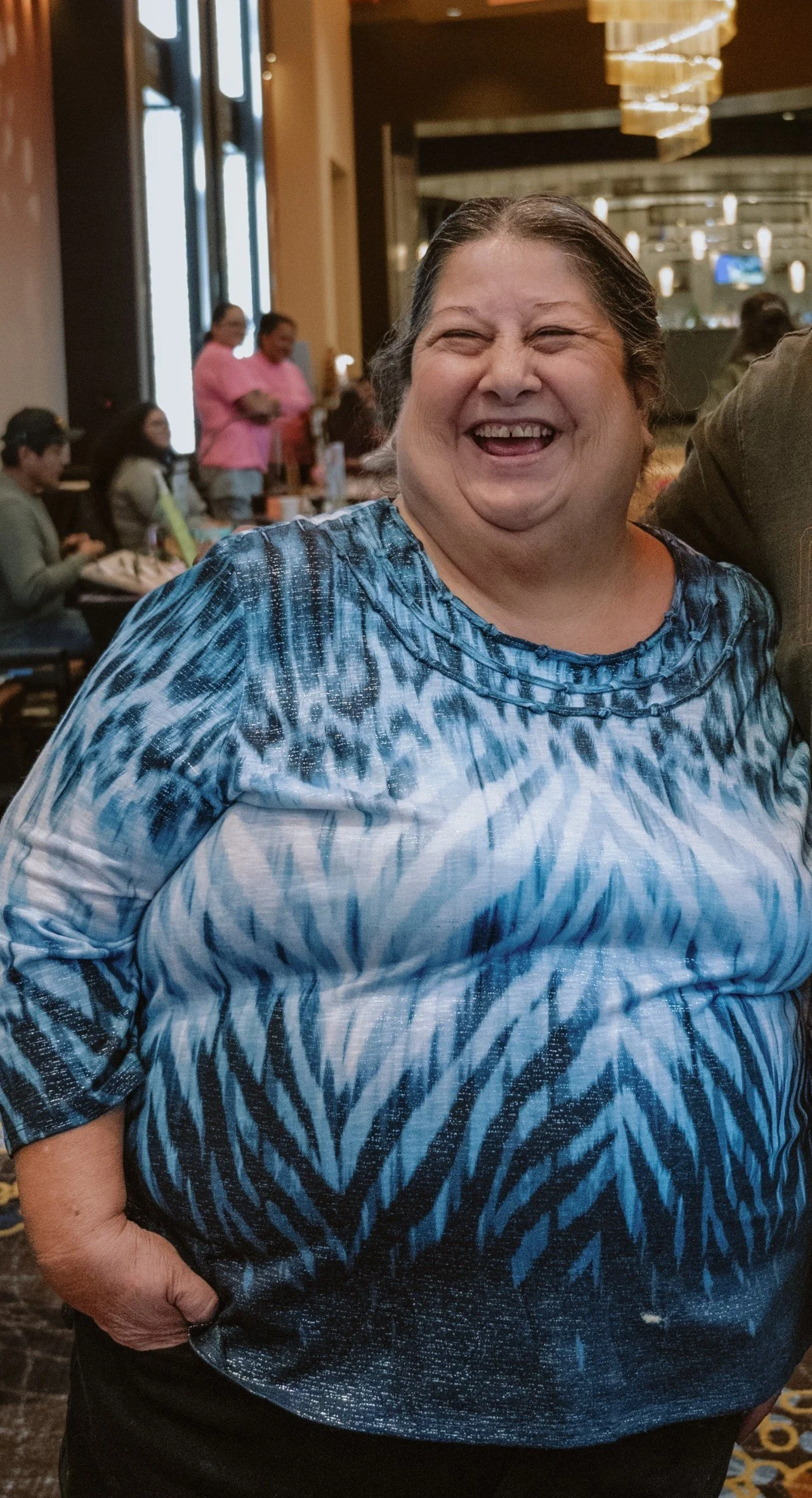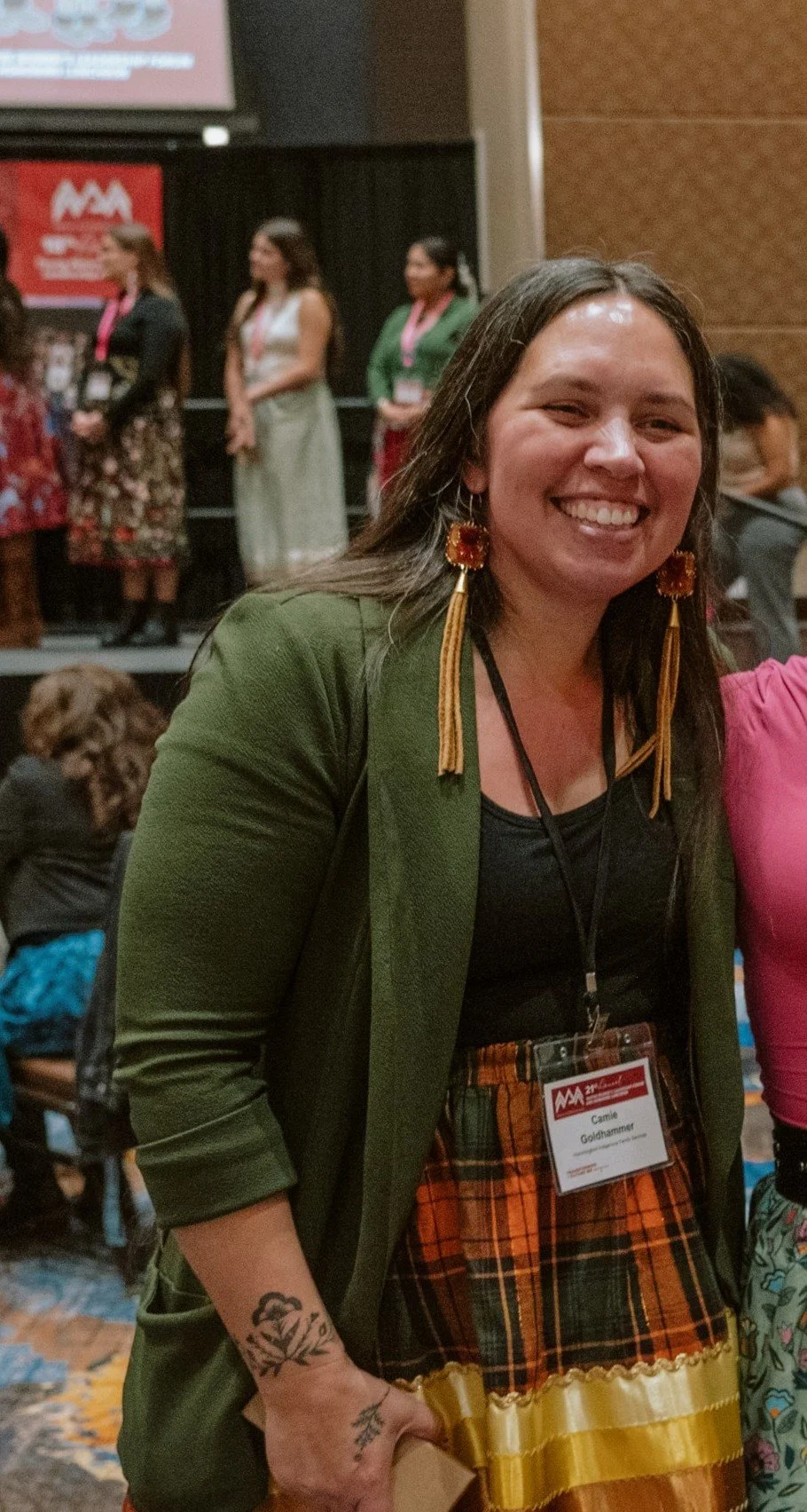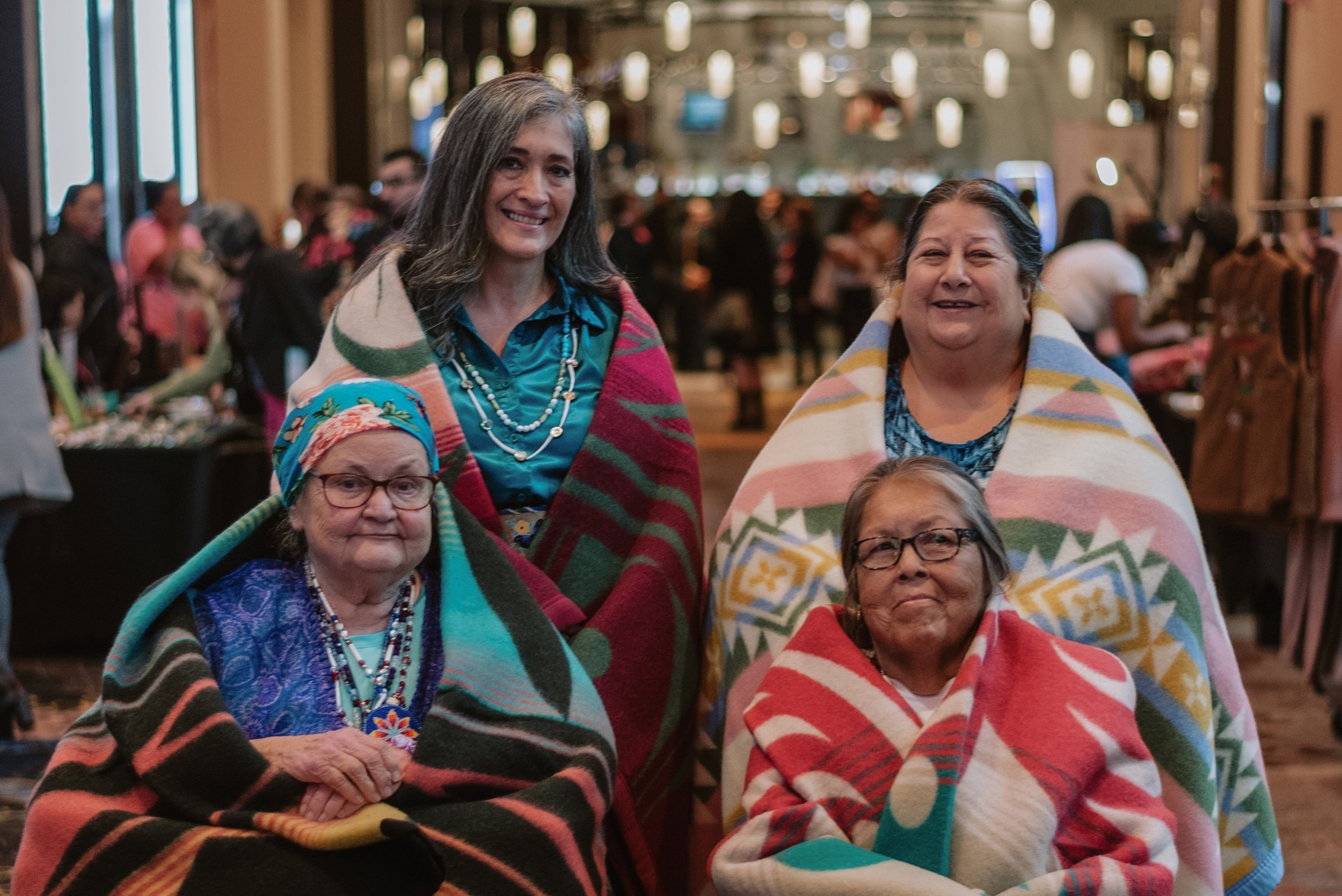
Enduring Spirit Honorees 2025
2025 Honorees
Congratulations to our 2025 Enduring Spirit Award honorees, Jill LaPointe (Nisqually/Upper Skagit), Connie McCloud (Puyallup), Arlene Red Elk (Jamestown S’Klallam Tribe), Marsha Wynecoop (Spokane) were selected as the 2025 Enduring Spirit Honorees. Santana Rabang (Lummi) was selected as the Rising Star Honoree. Camie Goldhammer (Sisseton-Wahpeton Oyaté) was selected as the Sister Spirit Honoree.
Jill LaPointe | Nooksack and Upper Skagit
Jill La Pointe, (Nooksack and Upper Skagit) is a Seattle University Pastoral Leadership graduate and renowned scholar and activist, and in 2024 became the director of the Indigenous Peoples Institute at the Seattle University.
Jill has expressed a deep connection to her grandmother, the upper Skagit elder Vi Hilbert, whose life mission was to revitalize and preserve the Lushootseed language: a language in the Salish family spoken from northern Oregon to central British Columbia.
She has worked with a range of different nonprofits and tribes, including the United Indians of All Tribes Foundation, a United Indians youth home, the Muckleshoot Tribe in their group homes, as well as the Upper Skagit and Snohomish Tribes. She has also held state jobs, where she worked closely with the Indian Child Welfare program, and then returned to the University of Washington to teach in the School of Social Work from 2007 to 2015.
Since 2006, she has served as the director of Lushootseed Research, a nonprofit organization founded in 1983 that aims to preserve and sustain the Lushootseed language. Her connections to Seattle U stretch back to 2006, when she and her partner, John La Pointe, attended the university, where they formed a cherished bond with Father Pat Twohy.
Now, after many initiative and projects later she serves as the new director of the Indigenous Peoples Institute at Seattle U. Jill expressed that returning to this space feels deeply meaningful to her and comments, "It felt like such a wonderful blessing and opportunity, right here next door to the building named after my grandmother, so I feel her spirit here a lot with us, and I think so dearly of Father Pat and how much he wanted this program to be here and be successful."
Connie McCloud | Puyallup
Connie McCloud has dedicated her life to healing and strengthening the Puyallup Tribal community through cultural revitalization, education, and traditional wellness. A lifelong culture bearer, McCloud began her journey with the Tribe when resources were scarce—when events were powered by love, donations, and determination. Today, she leads a multimillion-dollar cultural department that hosts programs and events reaching thousands, while staying grounded in the teachings and values passed down through generations.
As the Cultural Director for the Puyallup Tribe, McCloud is a keeper of traditions and stories. She has reawakened canoe journeys, helped restore traditional medicine and healing practices through the Salish Cancer Center and Native Healers, and remains a tireless advocate for youth, foster care, and community wellness. Her work is rooted in the understanding that health and strength come from living in balance—body, heart, mind, and spirit—with our Creator and the land.
McCloud’s leadership extends to regional and academic institutions. She played a foundational role in the creation of the University of Washington’s wǝɫǝbʔaltxʷ – Intellectual House, where she served as Elders Committee Chair, helped bless the grounds, and guided its cultural design and vision. Her wisdom and guidance have helped build safe spaces where Native students can thrive and connect with identity.
Throughout her career, she has served on Tribal Council, worked in health services, and led with humility and purpose. “I’m a worker,” she often says—a reflection of her unshakable commitment to future generations.
Connie McCloud’s life’s work ensures that Native children grow up with pride in who they are and where they come from—unafraid, connected, and empowered. Her legacy is one of cultural resilience, community strength, and deep love for her people.
Arlene Red Elk | Jamestown S’Klallam Tribe
Elder Arlene Red Elk is the Lead Facilitator and master designer of the Circle of Life workshop series. She specializes in multi-abuse trauma of violence against women. She is well known across Indian Country as a designer of services such as the original Ina Maka program at the United Indians of All Tribes Foundation. With more than forty years of experience, 33 years in recovery, and a master’s Degree, she has mastered the skills of combining culture with clinical practice. Her work as a survivor of multi-abuse trauma gives her extraordinary compassion and has allowed her to impact the lives of hundreds of Native women.
Marsha Wynecoop | Spokane Tribe
Marsha Wynecoop is a Spokane Tribal member born and raised on the Spokane Indian Reservation.
Marsha was hired in 1992 as the Spokane Tribe of Indian's (STOI) Language Curriculum Developer. Working closely with the fluent speaking elders in the Language Program, Marsha immersed herself in the Spokane language dialect (Interior Salish) and traditional practices of the tribe.
At the same time Marsha was working in the language program, she obtained her BA degree in Education from Eastern Washington University.
Marsha's hard work and commitment to the acquisition and proficiency in the language and traditional practices resulted in her promotion to the Language/Culture Manager position in 2002.
Meeting on a daily basis with the fluent speaking elders, Marsha assisted in the documentation of the language and stories the elders shared with her. The documentation was hectic, given the elders had different ways of speaking and spelling the words based on their location or the family they came from. Dialectical differences vary from location to location and family to family, but the elders would agree on the spelling of words and pronunciation.
Marsha also attended University of Oregon classes designed specifically for tribes, such as Culturally Based Language Curriculum Development, Native Language Linguistics, and more. These courses were instrumental in Marsha's push to develop a language dictionary, with the assistance of the elders.
In 1998, Marsha became a member of the First Peoples Language/Culture Committee (FPLC), a grassroots organization formed by tribes and members working on language revitalization efforts in Washington State, which is what she was hired to do on behalf of STOI.
FPLC worked closely with the State Board of Education (WBOD) on the development of a Washington Administrative Code (WAC) that focused on tribal teacher certification. Marsha was one of five tribal members that was part of a Subcommittee that FPLC and WBOD formed to develop and negotiate WAC 180-78A-700, the First Peoples Language Teacher Certification, which was adopted on January 17, 2003, by WBOD.
Marsha's expertise in language revitalization efforts provided other opportunities to work with various state agencies and organizations, such as the Multi-Ethnic Think Tank, OSPI Native Education Advisor, Gonzaga University NA Advisory BOD, Chairwoman Spokane Tribal College, Founder Back to the Heart Language/Culture Immersion School, to name a few.
Marsha is still working for STOI. as the Language Cultural Director.
Sister Spirit Honoree
Camie Goldhammer | Sisseton-Wahpeton Oyaté
Camie Goldhammer, MSW, LICSW, IBCLC (Sisseton-Wahpeton Oyaté) is a devoted leader for Indigenous families locally, nationally and internationally. She brings joy into all the work that she does and creates community and care in all her relationships. She is held by the love of her ancestors and the support of her community in pursuing a vision of increasing breast/chestfeeding and decreasing maternal and infant mortality in Native and Pacific Islander communities. Camie has spent nearly 20 years serving urban Native families most recently she founded Hummingbird Indigenous Family Service whose mission is “Healthy Indigenous babies, born into healthy Indigenous families, supported by healthy Indigenous communities.
Additionally, she created the first and only lactation counselor training created by Native people for Native communities and addresses the role that Historical Trauma (HT) and colonization have played in interrupting this traditional practice. Camie and her "breastfriend" Kimberly Moore-Salas (Diné) have trained nearly 1000 Indigenous Lactation Counselors or Indigi-LCs across Turtle Island and the Pacific. She served as the lead consultant on Michelle Obama's Let's Move Indian Country campaign supporting all 13 IHS hospitals in reaching Baby Friendly Hospital designation and worked as the Campaign Director to bring paid family and medical leave to Washington State which was signed into law in July 2017. She is a national leader on topics of racial equity, birth and breastfeeding reclamation, perinatal mental health and parenting practices in Native communities.”

